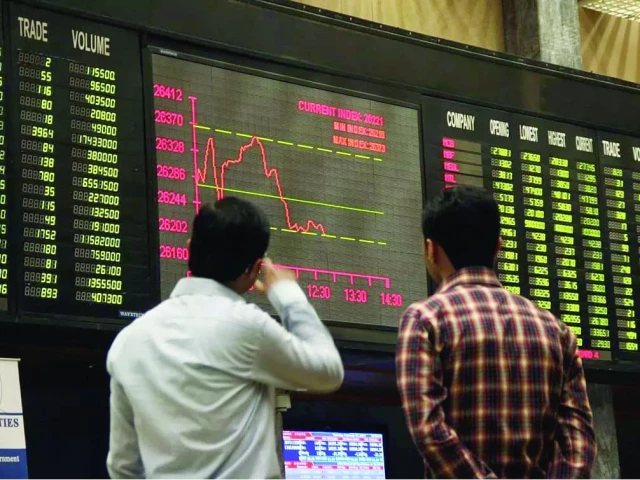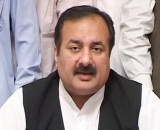Stocks cheer Pakistan-US energy agreement
KSE-100 index jumps 978 points, driven by increased activity in E&P sector

The Pakistan Stock Exchange (PSX) ended on a strong note on Thursday, fueled by investor enthusiasm following news of an energy agreement between Pakistan and the US. The KSE-100 index rose by 978.17 points, or 0.71%, to settle at 139,390.42.
Market participants welcomed the breakthrough, which included reduced trade barriers for Pakistan and a strategic partnership aimed at unlocking the country’s untapped oil potential. It sparked a wave of buying across key sectors, led by exploration and production (E&P) stocks.
Topline Securities, in its review, wrote that bulls stampeded through July, driving the KSE-100 index up by 11% month-on-month (MoM) to a record-shattering close at 139,390 points.
Read More: Pakistan, US seal trade deal
Market euphoria was fueled by the federal cabinet’s green light to the largest-ever financial restructuring plan, aimed at retiring Rs1.275 trillion worth of circular debt over six years, coupled with the State Bank’s steady hand on the policy rate, keeping investor confidence intact, it said.
Adding fuel to the rally was a slew of positive macro triggers. The Consumer Price Index (CPI) for June eased to 3.24%, signaling price stability ahead. Additionally, Pakistan posted its first annual current account surplus in 14 years, amounting to $2.1 billion. Remittances sent home by overseas Pakistanis also broke records, reaching $38.3 billion in FY25, with June inflows at $3.4 billion (up 8% YoY).
Car sales in June surged to 21,773 units, marking a 64% year-on-year (YoY) and 47% MoM increase, reflecting a resurgence in consumer demand, Topline mentioned.
Market Snapshot – July 31, 2025
— PSX (@pakstockexgltd) July 31, 2025
Unlock today’s market moves and stay one step ahead! pic.twitter.com/FbV6ptYxjV
KTrade Securities commented that stocks closed on a bullish note on Thursday as energy names led the rally. The KSE-100 index swung between an intra-day low of 139,084 and a high of 140,215, ultimately rising 978 points day-on-day to close at 139,390.
The rally followed the announcement of a successful Pakistan-US trade deal, which includes US support for exploiting local oil reserves, signaling potential investment in Pakistan’s energy sector, it said.
Key contributors to the index were Systems Limited, Oil and Gas Development Company, Pakistan State Oil, Mari Petroleum, Pakistan Petroleum, and Engro Holdings, KTrade added.
Arif Habib Limited (AHL) observed that trading above 140k continued to cap gains for the KSE-100. Some 60 shares rose, while 39 fell, with Systems Limited (+7.5%), Oil and Gas Development Company (+3.66%), and Pakistan State Oil (+5.02%) contributing the most to index gains.
On the other hand, Fauji Fertiliser (-1.41%), Bank Alfalah (-2.1%), and Engro Fertilisers (-0.73%) were the biggest drags.
Also Read: Petrol price may drop by up to Rs10
Oil names were all well bid and saw the highest traded value following comments from US President Donald Trump that his administration had struck a deal with Pakistan under which Washington would work with Islamabad to develop oil reserves. However, there was no update on tariffs, which the market eagerly awaited.
Among corporate news, Bank Alfalah (-2.33%) announced first-half earnings per share (EPS) of Rs9.55, down 31% YoY, along with a dividend of Rs5 per share. Habib Bank (-0.58%) announced 1HCY25 EPS of Rs23.44, up 16% YoY, and declared a dividend of Rs9.
AHL noted that a strong gap at the start of the session indicated that near-term support had risen to the range of 138.6k–139.4k. Heading into the last session of the week, the KSE-100 was up 0.13% week-on-week, with the possibility of hitting 140.5k.
Overall trading volumes increased to 577.3 million shares, compared with Wednesday’s tally of 425.8 million. Traded value stood at Rs36.3 billion.
Shares of 483 companies were traded. Of these, 235 stocks closed higher, 215 fell, and 33 remained unchanged. The Bank of Punjab led volumes, with trading in 83 million shares, rising Rs0.34 to close at Rs14.06.





















COMMENTS
Comments are moderated and generally will be posted if they are on-topic and not abusive.
For more information, please see our Comments FAQ